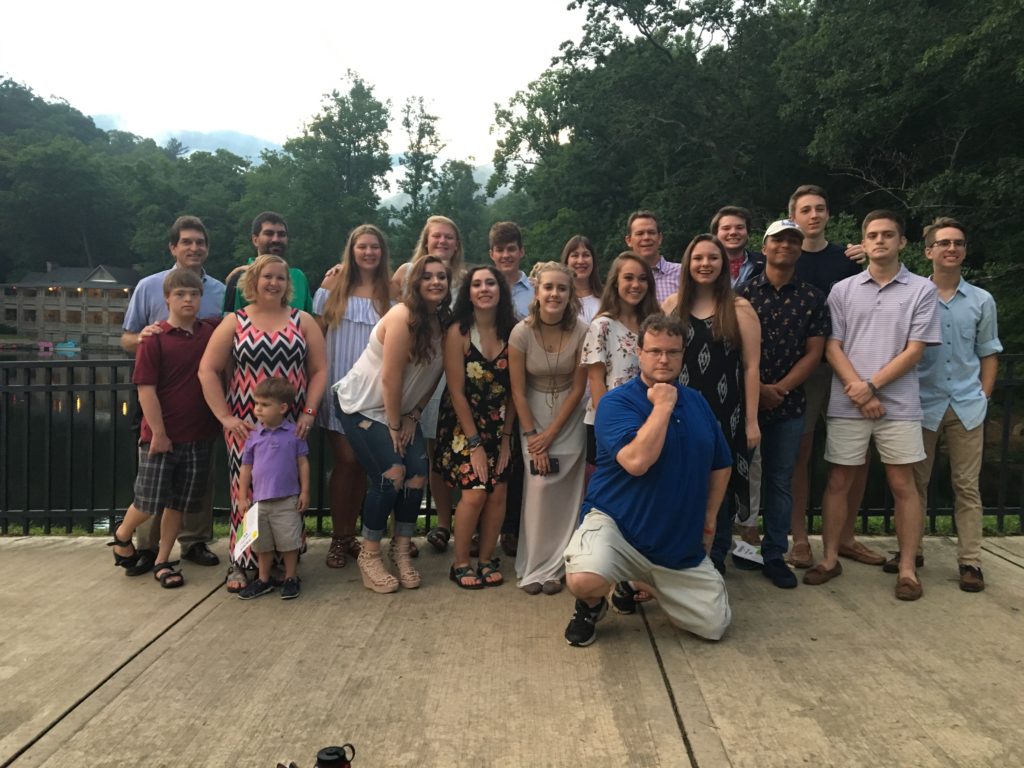Disruptions happen. Sitting in Anderson Auditorium with our youth a few weeks ago at Montreat, the morning keynote presentation began with saccharinely sweet music and several youth frolicking about with one another. A few moments later, the screens on the side blurred to that snowstorm or ants marching look of static, and the music blared an assault on the eardrums of chaos and screaming and anarchy. Those on stage began to turn over boxes and move in jarring, almost violent ways. You could feel the 1200 or so bodies in the pews shift from relaxed swaying to stiffening stillness. Posters began to appear on the stage: Illness, War, Anxiety, Discrimination, Divorce, Death, Natural Disaster, Leaving Home, Grief. The gaps in between were filled in with the words in our heads and hearts and the painful sighs when brokenness evades even our language.
The theme for Montreat’s youth conference this year was “A Missing Peace.” Planned many months ago, it served as an ample ground for deep conversations in the midst of a world marked by disruption after disruption on all levels of our existence. As I leader, I thought this theme held tremendous potential, and had eagerly approached this week with eyes toward the opportunity to talk about the things that really matter in our world and in our lives of faith, and perhaps to gain inspiration for the difficult work of peacemaking to which I deeply believe we are called, even though often I feel clueless as to how to go about it. But I found myself sitting in that auditorium on Thursday completely depleted of all my energies, my spirit struggling with the weight of it all. One thing after another had taken its toll, and I felt a palpable resistance among many of our youth, and even within myself, to truly be disrupted.
Disruptions happen, and we scatter. It seems that while we all know they exist, we’d rather pretend like they don’t, or distract ourselves and look in other directions when they rear their heads. This is particularly true when you are at a place like Montreat. Nestled in the mountains of North Carolina, this small town is home to one of our denomination’s national conference centers, which hosts a myriad of events throughout the year, offering spiritual renewal and a “place set apart” for retreat for the many who come through the gates. Montreat becomes a sacred place for many, myself included. It is a place we identify as a “thin place” where we feel wonderfully close to God, and expect a spiritual high that will sustain us until we can make it back up the mountain. If we’re really honest, most of us go to Montreat for that reason. We want the sugary, feel-good experience of faith that is comforting and familiar.
We don’t like it when things disrupt our faith experience. Whether it’s an unfamiliar hymn, someone sitting in our pew, or a different perspective of Scripture, we as Christians tend to be resistant to things that don’t neatly fit into our expectations of what “church” should be. And so we guard these kinds of experiences, whether that’s a youth conference at Montreat or a worship service on Sunday morning. No disruptions allowed. Eventually, though, that paradigm has to shift, because frankly God is not in the business of the status quo and maintaining. God is in the business of transformation. God doesn’t intend for us to leave the same way that we came. And that requires disruption. So perhaps instead of pushing back so much against it, people of faith might be wiser to respond in a different way, and consider that our own discomforts might be the spirit’s nudging to see and experience things in new ways, or at least provide an opportunity for us to reaffirm those things that are central and core to who we are, and reinvest our energies in those roots. Even and perhaps especially in the midst of disruption, we can find God. And maybe, if we can learn to experience God’s presence in the arguably small disruptions to the comforts of our faith experience, we will be more able to experience God’s presence in the midst of the disruptions of our lives beyond the sanctuary walls.
 As our keynote presenter, Rev. Paul Roberts (president of Johnson C. Smith Theological Seminary in Atlanta), said, disruptions can lead to discipleship. Throughout the witness of our Scriptures, this has been how God has operated. God disrupted the lives of the Israelites and the life of Moses to lead God’s people to freedom. God disrupted the life of Mary to become incarnate in our world through Jesus Christ. God disrupted believers at Pentecost and out of chaos, the church was formed. Disruption, it seems, is going to happen. And when it does, God is going to come calling. Our job is to figure out what part we can take in the work God is doing in the midst of those disruptions to use them for good. This, I think is more what Romans 8:28 is talking about; that God is able to work for good in any situation, and that God will always work for good. Sometimes, often, this happens through the answered call to discipleship of God’s people.
As our keynote presenter, Rev. Paul Roberts (president of Johnson C. Smith Theological Seminary in Atlanta), said, disruptions can lead to discipleship. Throughout the witness of our Scriptures, this has been how God has operated. God disrupted the lives of the Israelites and the life of Moses to lead God’s people to freedom. God disrupted the life of Mary to become incarnate in our world through Jesus Christ. God disrupted believers at Pentecost and out of chaos, the church was formed. Disruption, it seems, is going to happen. And when it does, God is going to come calling. Our job is to figure out what part we can take in the work God is doing in the midst of those disruptions to use them for good. This, I think is more what Romans 8:28 is talking about; that God is able to work for good in any situation, and that God will always work for good. Sometimes, often, this happens through the answered call to discipleship of God’s people.
And maybe that’s the answer to the “missing peace” we so often identify as an issue in our world; a willingness to embrace the life of discipleship that Christ modeled and calls us to join; a willingness to be disrupted, and to let God work in and through us for something bigger.
At the end of that keynote, the signs were flipped, signaling the ways God flips the tables and disruptions in our lives and out of chaos offers hope. Illness to Courage, War to Rebuilding, Anxiety to Empathy, Discrimination to Acceptance, Divorce to Blended Family, Death to Birth, Natural Disaster to Rainbow, Leaving Home to New Start, and Grief to Healing. I don’t know about you, but that’s the kind of peacemaking work that I want to be a part of; and that’s exactly the kind of work that God does out of the disruptions in our lives. May we be bold enough to be the disciples who join in.
For more information about Montreat Youth Conferences, check out http://www.montreat.org/montreat-youth-conference/.





